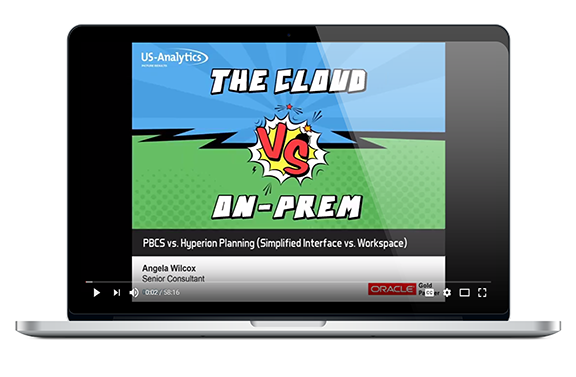The February updates for Oracle's Planning & Budgeting Cloud Service (PBCS) and Enterprise Planning and Budgeting Cloud Service (EPBCS) are here! This blog post outlines upcoming changes as well as several new features, including new REST APIs for administration and optimizing performance, new source expression types in data integration, and more.
The monthly update for PBCS and EPBCS will occur on Friday, February 15 during your normal daily maintenance window.
Updates for PBCS and EPBCS
View Size and Last Modified Date of Snapshot
The Snapshots tab in Migration has been modified to include the size and last modified date and time of available snapshots.

The last modified time is displayed based on the time zone specified in User Preferences. If it is not set, the last modified time is displayed based on the browser time zone.
To access the Snapshots tab, open Migration and then click Snapshots.
New Aggregate Storage Function in Calculation Manager
The @LIST (Argument) Aggregate Storage function has been added to Calculation Manager. This function can be used in the Point of View of an Aggregate Storage custom calculation or allocation.
@LIST (Argument) returns a list of members
HCM Extract Updates in Data Management
With this release, any time an Oracle HCM extract is updated to provide new functionality or definitions, a new file is created and made available to customers. A release version number is added to the new file name to identify it as a new template file. This feature enables customers to take the latest update, and at the same time retain all existing mappings and definitions for the target application in Data Management. Prior to this release in the Oracle HCM Cloud, the extract definitions could not be updated once they had been executed.
New Source Expression Types in Data Integration
In this release, new source expressions types have been added for the import format. Expressions operate on the value that is read from the import file. They are used to transform and augment values for source dimensions.
In addition to the existing Rpad, Lpad, and Constant source expression types, the following expression types are now available for non-Amount source dimensions: Default, Prefix, Replace, Split, Suffix, Substring, Ltrim, Rtrim, and Conditional.
The source expressions for Amount source dimensions have not changed from the previous release.
As with target expression types, you can specify when to process expressions. You can process them during the import step or during the actual data load. Expressions processed at the import stage may improve load performance when working with large data sets.
NOTE: The new Data Integration source expression types are not available in Data Management.
Deleting an Integration in Data Management
In this release, you can now delete an entire integration including the name, import format, location, mappings and data rules created in Data Integration. The process to delete the integration has been made available under System Maintenance Tasks in Data Management. You simply pick the LOV and execute the new Delete Integration script.
New REST APIs for Administration and Optimizing Performance
Administrators can now use these new REST APIs to optimize the performance of an application.
- Set administration mode for an application.
- Compact the outline file of an aggregate storage cube.
- Perform a full restructure of a block storage cube to eliminate or reduce fragmentation.
- Merge incremental data slices of an aggregate storage cube to improve performance.
- Optimize aggregation to improve the performance of aggregate storage cubes.
EPBCS Only
Calculating Incremental Workforce Data
At the beginning of a planning cycle, you might load the entire data for a given scenario and version. However, to stay up-to-date with HR changes, you can import new and update information frequently. With this release, processing and calculation performance is greatly improved when loading updated data into Workforce using Data Management.
The Incremental File Adapter in the Data Management process identifies the changed data that needs calculating from a source data file with a previous version of the source data file. This feature can greatly improve load and calculation performance. Workforce provides new rules that dynamically generate the appropriate calculation script, depending on the changed and new data in the data load file and thus calculates only the data for the modified intersections. The focused calculation rule executes only on the data that has been modified or is new since the last load.
After the Data Management load process, the changed and new data displays in the appropriate Workforce forms. The data reflects calculations applied in the load process.
New Workforce Forms Enable Quick Updates to Source Data
You can now quickly make changes to the source data for existing employees, entities, and jobs in new Workforce forms. Four new forms enable you to update source data and limit the calculation to the modified or new data, thus reducing the processing time. Calculation logic is optimized because each form is associated with rules appropriate for the kind of data you updated. You update the source data in the form best suited to your changes.
Upcoming Changes
Removal of Support for Transport Layer Security Protocol 1.0 and 1.1
Starting with the May 2019 update (Release 19.05) to EPM Services, Oracle will support only Transport Layer Security protocol version 1.2 (TLS 1.2) to communicate with EPM Cloud. To ensure the highest level of authentication and data encryption security, TLS 1.0 and TLS 1.1 will no longer be supported after your environments are updated on May 3, 2019.
NOTE: Support for TLS versions 1.0 and 1.1 will be removed for both your Test and Production environments on May 3, 2019.
Because most modern operating systems and browsers support TLS 1.2; users of such systems and browsers will not be affected by the deprecation of TLS 1.0 and 1.1. EPM Automate and Smart View are also not affected by this change.
After the 19.05 update on May 3, 2015, you cannot use client operating systems that do not support TLS 1.2 (for example, Red Hat Enterprise Linux 5 and Microsoft Windows 2002) to run operating system-specific commands (for example, code to run cURL tools to transfer data and custom code that integrates with the Rest APIs) against EPM Cloud. Additionally, Smart View installed on such systems will also fail to communicate with EPM Cloud. Similarly, you cannot use browsers that do not support TLS 1.2 protocol to access EPM Cloud environments.
Classic Dimension Editor
With a view to allowing customers more time to familiarize themselves with the Simplified Dimension Editor, Oracle has decided to defer the removal of support for Classic Dimension Editor to a future update in 2019. Oracle will notify you at least two months prior to the removal of the feature.
Ability to Create New Composite Forms
Oracle will remove the ability to create new composite forms (forms that comprise multiple simple forms) starting with the March 2019 update to the service (March 01, 2019 for test environments and March 15, 2019 for production environments). After the March update, all existing composite forms can still be edited and used. Removal of the ability to create composite forms impacts only the creation of new composite forms in the service.
All customers are advised to use dashboards in place of composite forms. No more enhancements will be made to the composite forms functionality.






